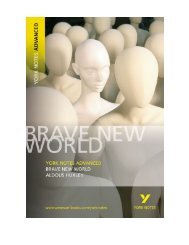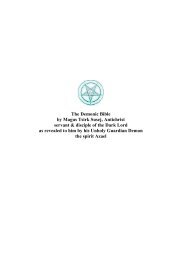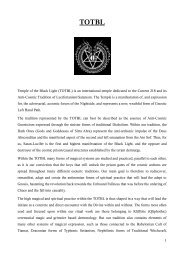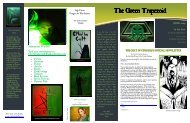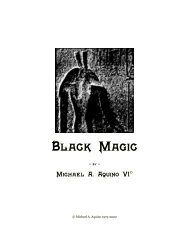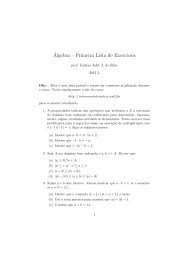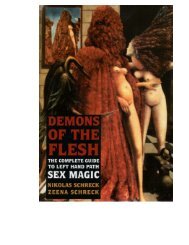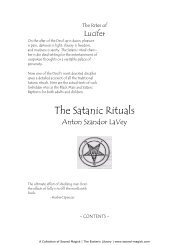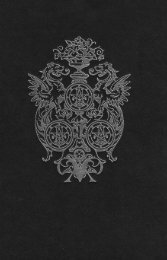Satanism Today - An Encyclopedia of Religion, Folklore and Popular ...
Satanism Today - An Encyclopedia of Religion, Folklore and Popular ...
Satanism Today - An Encyclopedia of Religion, Folklore and Popular ...
You also want an ePaper? Increase the reach of your titles
YUMPU automatically turns print PDFs into web optimized ePapers that Google loves.
Mathers, Samuel Liddell 169<br />
executed as witches (after the “craze” got rolling,<br />
almost anyone was susceptible to accusations <strong>of</strong><br />
witchcraft) were either outsiders—an Irish<br />
Catholic <strong>and</strong> a West Indian slave—or New<br />
Engl<strong>and</strong>ers who had deviated enough from<br />
Puritan values to be transformed into moral<br />
outsiders. Mather’s participation in this perspective<br />
(outsider = demonic) is evident in the above<br />
remarks associating the demonic with Indians as<br />
well as in some <strong>of</strong> his “experiments” with Martha<br />
Goodwin. For example, while Martha’s tormenting<br />
spirits would permit her to read neither the<br />
Bible (“her Eyes would be strangely twisted <strong>and</strong><br />
blind”) nor books by Puritan authors (which<br />
“would bring hideous convulsions”), she was quite<br />
able to read Quaker <strong>and</strong> “popish” (i.e., Catholic)<br />
works. In other words, in Mather’s mind, all <strong>of</strong> the<br />
colony’s external <strong>and</strong> internal enemies worked<br />
together, <strong>and</strong> all were minions <strong>of</strong> Satan.<br />
For the Puritans, the greatest possible harm that<br />
could be effected by witches was spiritual rather<br />
than physical death. In the cases examined by<br />
Cotton Mather, the infernal assault on the young<br />
women under his care was understood (as we saw<br />
in the instance <strong>of</strong> Mercy Short) in terms <strong>of</strong> a<br />
“Captivity to Spectres,” <strong>and</strong> his interest in their<br />
troubles understood as efforts to “rescue” them<br />
from hell. Mather had a high opinion <strong>of</strong> the efficacy<br />
<strong>of</strong> his efforts. In one place in his diary, for<br />
example, he recounted that he “cried unto the<br />
Lord . . . for the Deliverance <strong>of</strong> a young Woman,<br />
whom the Powers <strong>of</strong> Hell had now seized upon.<br />
<strong>An</strong>d behold! Without any further Noise, the<br />
possessed Person, upon my praying by her, was<br />
delivered from her Captivity.” In at least one<br />
instance, his perception <strong>of</strong> demonic assault in<br />
terms <strong>of</strong> captivity was so vivid that he felt himself<br />
actually striking <strong>of</strong>f the victim’s invisible bonds:<br />
“There was one very singular passion that<br />
frequently attended her. <strong>An</strong> Invisible Chain would<br />
be clapt about her, <strong>and</strong> shee, in much pain <strong>and</strong><br />
Fear, cry out, When They began to put it on. Once<br />
I did with my own h<strong>and</strong> knock it <strong>of</strong>f, as it began to<br />
be fastned about her.” Cotton Mather’s community<br />
was less successful in defending its children from<br />
the spiritual attacks <strong>of</strong> Satan’s other supposed<br />
minions, the American Indians. The Puritans were<br />
particularly disheartened by the readiness with<br />
which young people captured by Native Americans<br />
adopted “savage” ways. The success that American<br />
Indians achieved in their efforts to convert<br />
Euramerican children to aboriginal lifestyles may<br />
have been part <strong>of</strong> the reason for New Engl<strong>and</strong>ers’<br />
attraction to tales recounted by former captives <strong>of</strong><br />
Native Americans: As individuals who had<br />
managed to resist the temptations <strong>of</strong> the Indian<br />
mode <strong>of</strong> life, ex-captives could reassure the<br />
colonists that the “New Engl<strong>and</strong> Way” was far<br />
preferable, <strong>and</strong> the apparent attractions <strong>of</strong> a savage<br />
lifestyle (e.g., its imagined freedom) illusory.<br />
In spite <strong>of</strong> the marked antipathy expressed by<br />
captives toward their captors, the earliest captivity<br />
tales, such as Mary Rowl<strong>and</strong>son’s Sovereignty <strong>and</strong><br />
Goodness <strong>of</strong> God, were saved from being anti-<br />
Indian hate tracts by their focus on the captives’<br />
inner spiritual dramas. Cotton Mather has the<br />
dubious distinction <strong>of</strong> being the first Puritan<br />
consciously to deploy captivity tales, shorn <strong>of</strong> their<br />
inner dimension, as anti-Indian propag<strong>and</strong>a.<br />
See also Salem Witchcraft<br />
For Further Reading:<br />
Mather, Cotton. “A Br<strong>and</strong> Pluck’d out <strong>of</strong> the<br />
Burning.” 1693. In G. L. Burr, ed. Narratives <strong>of</strong><br />
the Witchcraft Cases. New York: Barnes <strong>and</strong><br />
Noble, 1968.<br />
———. Magnalia Christi Americana; or, The<br />
Ecclesiastical History <strong>of</strong> New-Engl<strong>and</strong>. Vol. 2.<br />
1698. Hartford, CT: Silas <strong>An</strong>drus, 1820.<br />
———. “Memorable Providences, Relating to<br />
Witchcrafts <strong>and</strong> Possessions.” 1689. In G. L.<br />
Burr, ed. Narratives <strong>of</strong> the Witchcraft Cases. New<br />
York: Barnes <strong>and</strong> Noble, 1968.<br />
Silverman, Kenneth. The Life <strong>and</strong> Times <strong>of</strong> Cotton<br />
Mather. New York: Columbia, 1985.<br />
Mathers, Samuel Liddell<br />
Samuel Mathers (1854–1918), a founder <strong>of</strong> the<br />
Hermetic Order <strong>of</strong> the Golden Dawn, had a significant<br />
but indirect influence on modern religious<br />
<strong>Satanism</strong> through Aleister Crowley, a one-time<br />
member <strong>of</strong> the order. Born into a Scottish family<br />
in London, Engl<strong>and</strong>, <strong>and</strong> he later gave himself the<br />
first name <strong>of</strong> MacGregor to reflect his Scottish<br />
heritage. His father died when he was young <strong>and</strong><br />
his mother then supported the family as a clerk in<br />
the town <strong>of</strong> Bournemouth.<br />
Mathers remained at home, reading widely



